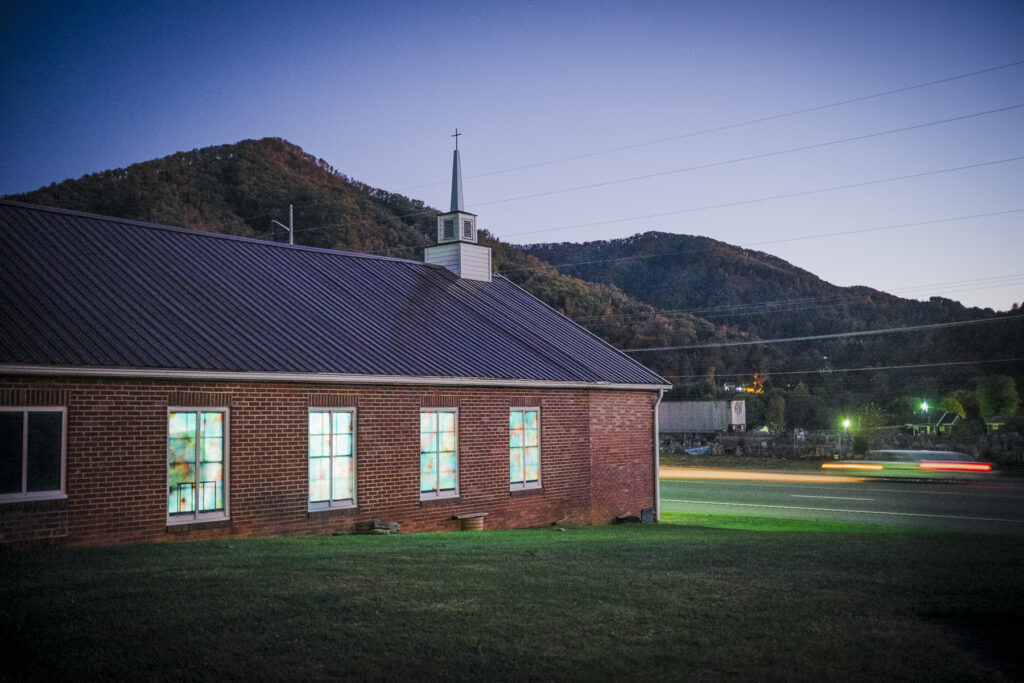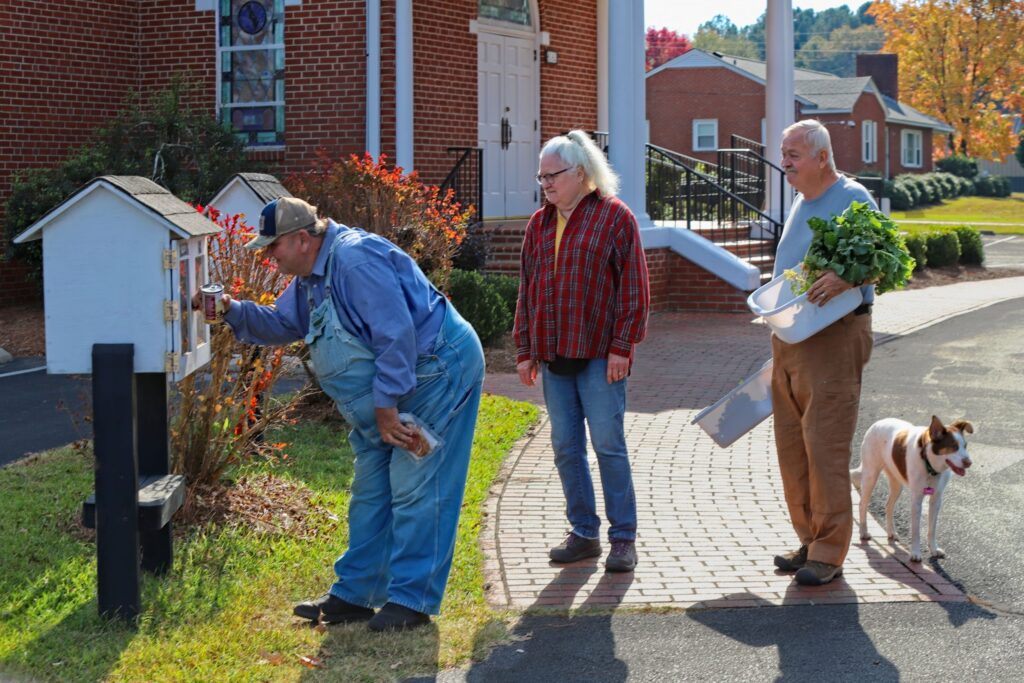2024 Annual Report:
Churches in small towns and other rural areas fill important roles for communities
Christian congregations serving rural areas are places of worship, prayer and spiritual formation. Like churches everywhere, they make sacred the pivotal moments in the lives of individuals and families through baptisms, weddings and funerals and are places where Christian traditions are passed on to new generations.
Yet congregations in rural areas often play larger roles in supporting the civic life of their communities. They host town meetings because a sanctuary may be the largest meeting place for miles around. Many also provide space for social and community service organizations and may house their community’s only child-care center.
“In many rural communities, other longstanding institutions have gone away,” said Marty Newell, Chief Operating Officer of the Center for Rural Strategies in Whitesburg, Ky. “For decades they have seen public school consolidation that led to the closing of the local elementary school and high school. There used to be mom-and-pop stores that had a coffee pot and a few tables and chairs where people connected after they did their shopping. Now they’re gone. There’s no coffee pot waiting for you at the dollar store.”

Valley Forge Faith and Love Church in Elizabethton, Tenn.
In 2024, recognizing the many important roles congregations play in nurturing the spiritual life and supporting the vitality of rural communities, Lilly Endowment launched the Ministry in Rural Areas and Small Towns Initiative. The Endowment made grants to 20 organizations throughout the country to encourage them to provide resources to help congregations in these settings enhance their ministries and strengthen the leadership of the pastors and lay leaders who guide them.
Too often congregations in rural areas and small towns don’t have the kind of resources they need to maintain vibrant ministries and strong leadership to help their congregations and their greater communities flourish, according to David L. Odom, executive director of Leadership Education at Duke Divinity in Durham, N.C.
“Congregations in rural areas find creative solutions for all sorts of problems encountered by their neighbors because they are in places that don’t get much attention from government or media,” said Odom, who pastored rural churches in North and South Carolina for 12 years. “But decades of being overlooked and isolated takes a toll on even the most dedicated faith communities. A modest investment of attention and money can make a big difference in encouraging creative action.”

Preschool at First United Methodist Church, Murphy, N.C.
The Ministry in Rural Areas and Small Towns Initiative is designed to help congregations respond to the challenges they face as they seek to serve their communities. Populations in rural communities are generally aging faster than compared to urban and suburban areas. Per capita income is lower, putting additional pressure on rural church budgets. And often it is more difficult for rural congregations to attract and retain pastoral leaders, so they rely heavily on bi-vocational clergy and on lay leaders.
Ranging from $1,425,863 to $7.5 million, the grants awarded through the initiative total more than $95 million. Funds will support educational opportunities to strengthen the leadership of ordained pastors and lay leaders; foster efforts to help congregations enhance and revitalize their ministries; and help congregations build stronger and more strategic relationships with organizations in their local communities. Among the funded organizations are:
- Seminary of the Southwest, based in Austin, Texas, which will develop Locally Grown Leaders in conjunction with the Iona Collaborative, a national network of 35 Episcopal dioceses across the nation. Working with the collaborative, the Seminary of the Southwest will develop resources to prepare seminarians and lay leaders to serve rural parishes; provide continuing education and spiritual formation for ministers already serving in rural settings; and support data-driven evaluation and planning so seminaries and dioceses throughout the country can better prepare pastors for rural ministry.
- Catholic Rural Life, based in St. Paul, Minn., which will strengthen and expand its network of partner organizations in 29 dioceses in 20 states that provide educational, spiritual and service events in their parishes and dioceses. New efforts will include regional conferences focused on spiritual and vocational training of pastors, lay pastoral leaders and education professionals; development of a virtual library of resources for partner organizations serving rural parishes and lay leaders; and a national gathering to share lessons learned.
- Wheaton College Billy Graham Center, based in Wheaton, Ill., which will expand its efforts to support rural churches through the Rural Church Institute. It will develop a cohort program to equip pastors in rural settings to help their congregations reach more effectively people who do not attend church; develop accessible training programs to equip current and aspiring rural pastors; and collaborate with several networks of churches to strengthen its research about rural ministry and improve its outreach to congregations in rural areas.
- NC Rural Center, based in Raleigh, N.C., which will expand the reach of the Connect Church Program. The program helps pastors and lay leaders from rural churches identify the resources they have to offer their communities, understand trends and opportunities facing their communities, and develop strategic plans for increasing impact outside the walls of their churches.

Center United Methodist Church, Sanford, N.C. food sharing program
Two organizations funded in the initiative, Indiana University’s Center for Rural Engagement based in Bloomington, Ind. (funded through a grant to the Indiana University Foundation) and the Center for Rural Strategies in Kentucky, will draw on their research and experiences in working with rural communities to provide resources and support to other organizations in the initiative.
The Center for Rural Engagement at Indiana University was founded in 2018 to help rural communities address pressing challenges they face and celebrate the unique culture and heritage of rural life. Collaborating with IU scholars in social work, public health and applied research, among others, the Center will work with rural Indiana congregations and other organizations nationwide funded through the initiative to help churches strengthen their abilities to support access to mental well-being resources in rural communities.
The Center for Rural Strategies located in coal country near the border of Kentucky and West Virginia has more than two decades of experience working with rural communities and churches throughout the United States, according to Whitney Kimball Coe. She is vice president of national programs at Rural Strategies and a seminarian preparing to become an Episcopal priest.
“We’re familiar with the heartbreaks and the joys of living in rural areas, and the project we’re embarking upon will build upon what we know to be true: our lives are shaped by the stories we tell ourselves and one another,” Coe said. “Churches are multi-faceted places within their rural communities. There has been some loss and decline. But faith communities still operate with the inexhaustible resources of hope and love.”
Rural Strategies will use various media to share stories of how congregations are responding to the most significant challenges and opportunities they and their communities face. Their storytelling will also explore how congregations are taking the lead to strengthen rural areas through collaboration with other organizations in their communities.
Newell of Rural Strategies believes that congregations serving rural areas have the potential to play important roles in enhancing the vitality of their communities—especially if they are open to connecting with and learning from other churches.
“If they are willing to be outward facing and willing to embrace their roles in the larger civic life, they really have the opportunity to add to the vibrancy of their faith community and the larger community,” he said. “Through connecting with one another’s stories, faith communities can imagine what’s possible.”
Organizations funded through the initiative will serve congregations from Anabaptist, Black Church, Catholic, evangelical, mainline Protestant, and Pentecostal traditions. A number of these organizations also will support efforts to serve growing Hispanic constituencies in rural areas.
This initiative complements Endowment grants that are supporting intentional efforts to help strengthen churches in cities. Among the grants are those to City Seminary of New York in 2020 and in 2022 that have supported the development of national and regional learning networks across the U.S.